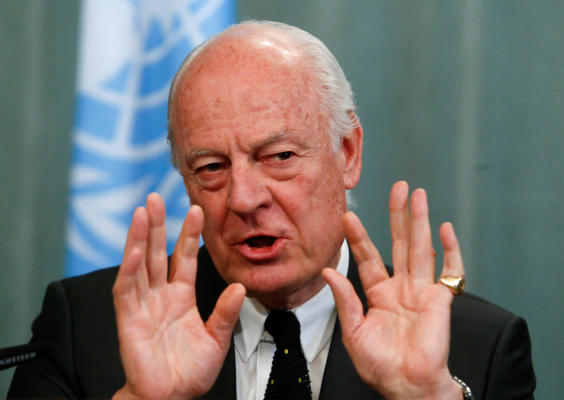The sight of special envoys flocking to the region to resolve its crises is not a reason for optimism. Their presence in itself is an indication that local parties are unable to solve their own problems and have resorted to the international community for help and therefore the crisis becomes internationalised.
Currently there are four UN envoys in the region and three are dealing with post-Arab Spring crises and wars. They are the UN envoys to Syria, Libya and Yemen. We do not hear a lot about the fourth envoy, his crisis is an old one that dates back to the colonial period – the Sahara issue. The number of envoys to the region shows the scale of the crisis, turmoil and recent chaos.
Syria is the largest crisis in the region, and it seems that even the great powers which have become party to it are unable to arrive at a solution. The US Secretary of State John Kerry’s statement that the civil war there has become out of control in a number of ways indicates surrender to what is happening on the ground and the state of despair that has led to the brutal and horrific situation.
The least internationalised crisis is in Yemen due to the fact that regional parties led by Saudi Arabia are preventing the situation from spiralling out of control. The UN envoy to Yemen Ould Cheikh succeeded in gathering the warring parties in Kuwait, and despite Houthi violations and manoeuvres, there is reason to believe that a solution can be found in the future.
Libya is a different issue; there is no fighting or an internal war in the literal sense, but there is an attempt to restore militias and insurgents to government and remove ISIS supporters from oil fields. The goal of the international community is to stop boats of migrants crossing the sea and fight ISIS terrorism.
Crises feed each other and terrorism has become transnational. ISIS came out of the womb of the remnants of the Iraqi Ba’ath regime and then moved to Syria. It is now trying to expand in Libya in an effort to procure financial resources from oil smuggling. Internal crises create chaos, as happened in the Iraqi parliament recently and that pushed an MP to ask “Do you want us to be like Libya’s parliament which meets in Tobruk, hundreds of miles from the capital which the international community – backed government is trying to impose its control over?”
All parties are worried. If the Libyan government came from Tunisia, then most politicians in Iraq came via planes from the neighbourhoods of west London. We do not know where the rest of the governments came from, and this is why we appeal to the international parties to resolve their conflicts in the region.
It has been proven that the most complex and serious crises can be resolved through direct negotiations and sitting face to face, as Sadat did with Israel after four wars. The two countries made a peace agreement that still stands today and is considered one of the elements of the current regional system. Had Sadat relied on international envoys, Sinai would have remained in the hands of Israel to this day, just like the Golan Heights.
Syria is the centre of the crisis now, and reaching a solution there will result in the same happening in other inflammatory pits like Libya. Some fear that something worse than ISIS that will benefit from the remains and remnants of the Baathist regime will be born in Libya.
The two main parties, Washington and Moscow, need political will in order to resolve the crisis. However, to say that the situation is uncontrollable is unconvincing. The two main parties must detangle a complex web of strings, like Iranian interference and Hezbollah, that make the crisis difficult. Then they must address the Kurdish topic wisely to break up the scuffle with Turkey in the crisis. Washington and Moscow possess the tools and the ability to solve the situation.
